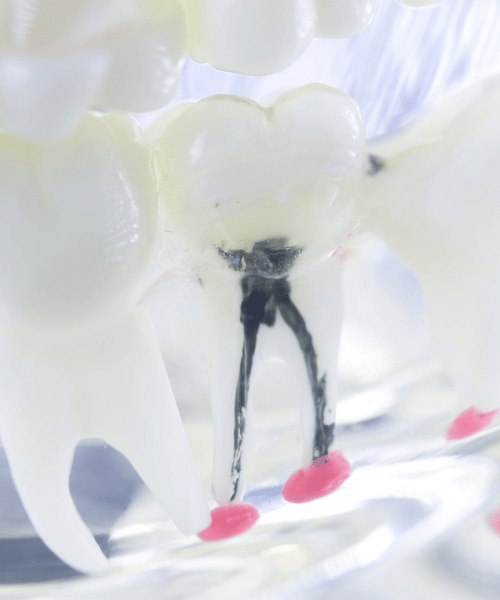When it comes to dental procedures, root canal treatment (RCT) is one that can cause anxiety for many patients. However, this procedure can be essential in saving a damaged or infected tooth from extraction. In this blog, we will discuss why RCT is required, whether it hurts, how to manage post-treatment discomfort, and what the alternatives to RCT are.
Why is Root Canal Treatment Required?
When the pulp, the soft tissue inside the tooth that contains nerves and blood vessels, becomes infected or inflamed due to deep decay or trauma, it can lead to severe pain, sensitivity, and swelling. If left untreated, the infection can spread to the surrounding tissues and cause abscesses or even bone loss.
Root canal treatment is required to remove the infected or inflamed pulp and replace it with a filling to prevent further damage or infection. This procedure can save the natural tooth and prevent the need for extraction, which can lead to more significant problems in the future.
Does Getting a Root Canal Treatment Hurt?
The idea of getting a root canal treatment can be scary, but the procedure itself should not be painful. The dentist will administer local anesthesia to numb the area before starting the treatment. You may feel some pressure or discomfort during the procedure, but it should not be painful.
After the procedure, you may experience some mild discomfort or sensitivity, but it can be managed with over-the-counter pain relievers such as ibuprofen. In rare cases, you may experience severe pain or swelling, which could indicate an infection or other complications. In such cases, it’s essential to contact your dentist immediately.
How to Manage Post-Treatment Discomfort?
After a root canal treatment, it’s normal to experience some mild discomfort or sensitivity for a few days. To manage post-treatment discomfort, follow these tips:
1. Take over-the-counter pain relievers as directed by your dentist or pharmacist.
2. Avoid biting or chewing on the treated tooth until it’s fully restored.
3. Practice good oral hygiene, including brushing and flossing regularly.
4. Avoid hard or crunchy foods that can cause discomfort.
5. Apply an ice pack to the affected area for 10-15 minutes at a time to reduce swelling.
If you experience severe pain, swelling, or discharge from the treated tooth, contact your dentist immediately.
What are the Root Canal Alternatives?
In some cases, root canal treatment may not be the best option for saving a damaged or infected tooth. Here are some alternatives to RCT:
1. Extraction: If the tooth is severely damaged or infected, it may need to be extracted. However, extraction can lead to other complications such as shifting of adjacent teeth, bone loss, and difficulty eating and speaking.
2. Antibiotics: In some cases, antibiotics may be prescribed to treat the infection and reduce pain and swelling. However, antibiotics cannot remove the infected pulp or prevent further damage to the tooth.
3. Dental Implants: Dental implants are artificial teeth that are surgically placed into the jawbone to replace a missing tooth. However, implants can be expensive and require multiple visits to the dentist.
4. Crown: A crown is a cap that is placed over the damaged tooth to restore its shape, size, and strength. However, a crown cannot remove the infected pulp, and the infection can spread to the surrounding tissues.
How long does the Root Canal Treatment take?
The length of the procedure depends on the severity of the infection or inflammation and the complexity of the root canal system. Typically, a root canal treatment can be completed in one or two visits, each lasting about 60 to 90 minutes. However, in some cases, the treatment may take longer, and multiple appointments may be required.
What happens after the Root Canal Treatment?
After the root canal treatment, the dentist will place a temporary filling or crown to protect the treated tooth. You may be required to schedule a follow-up appointment to complete the restoration process, which may involve placing a permanent filling or crown.
Is Root Canal Treatment Safe?
Root canal treatment is a safe and effective dental procedure with a success rate of up to 95%. The procedure has been around for over a century and has undergone numerous improvements in techniques and equipment.
How much does Root Canal Treatment cost?
The cost of root canal treatment varies depending on factors such as the severity of the infection or inflammation, the complexity of the root canal system, and the location of the affected tooth. In general, root canal treatment can cost between $500 to $1,500 per tooth, depending on the location and the provider.
Conclusion :
root canal treatment is a crucial dental procedure that can save a damaged or infected tooth from extraction. While the procedure may cause anxiety for some patients, it should not be painful. With proper post-treatment care and management, discomfort can be minimized. If you are unsure whether RCT is the best option for you, consult with your dentist to explore alternative options.




